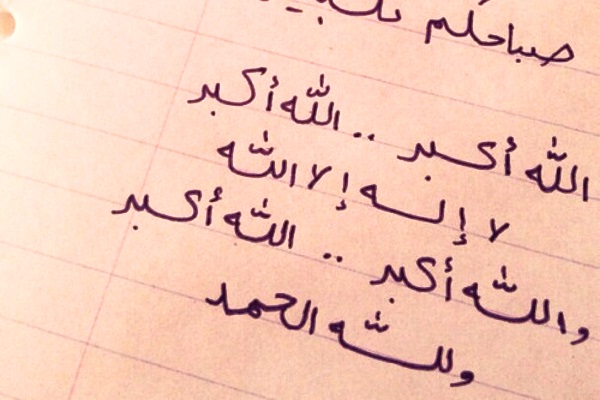

By: MuslimVillage (compiled and edited)
Source: MuslimVillage
It is necessary (wajib) for every Muslim (male or female, whether praying in congregation or alone) to say the following takbir (declaration of the greatness of Allah) immediately after each obligatory (fard) prayer from the Fajr Prayer on the 9th of Dhu’l Hijjah (the Day of `Arafah which is the day before Eid) to the Asr Prayer on the 13th of Dhu’l Hijjah (the day after the final day of Eid).
Thus, these takbirs last 5 days, and 23 prayers.
The takbirs:
Transliteration: Allahu Akbar, Allahu Akbar, La ilaha illa Llahu.
Wa Llahu Akbar, Allahu Akbar wa lillahi Lhamd.
Translation: Allah is the greatest, Allah is the greatest, there is no god but Allah.
And Allah is the greatest, Allah is the greatest and to Allah belongs all praise.
This wording is preferred in the Hanafi school of Sunni jurisprudence. One recites them after concluding any of the five daily obligatory prayers as long as one has not spoken mundane speech (unrelated to the prayer). It is only necessary to say it once.
Concerning these words, some jurists have mentioned that when Jibril (the angel Gabriel – peace be upon him) descended with the ram at the time when sayiduna Ibrahim (Abraham – peace be upon him) was about to sacrifice his son Ismail (Ishmael – peace be upon him), that the angel said, “Allahu Akbar, Allahu Akbar” to stop sayiduna Ibrahim (peace be upon him) from slaughtering.
When sayiduna Ibrahim (peace be upon him) saw sayiduna Jibril (peace be upon him) descending he said, “La Ilaha Illah Wallahu Akbar” and when sayiduna Ismail (peace be upon him) saw this he said “Allahu Akbar Wa Lillahil Hamd”.
However, the Muhadditheen (scholars who specialize in Hadith transmission) have disputed the authenticity of this.
The wording of the Takbir has been mentioned in Musannaf ibn Abi Shaybah with a sound chain of narrators. It has also been mentioned that sayiduna Abdullah ibn Masood (Allah be pleased with him) used to recite this and it became the general practice of the Sahabah (Allah be pleased with them). (Raddul Muhtar Vol.2 Pg.178)
It is also narrated about sayiduna Ali (Allah be pleased with him) that he used to recite the Takbir from after Salatul Fajr (9th Zul Hijjah) on the Day Arafah till Asr of the last day of Tashriq (13th Zul Hijjah). He used to recite the Takbir after Asr. (I’laaus Sunan Vol.8 Pg.120 from Musannaf ibn Abi Shaybah and Nasbur Rayah)
Likewise, Ubaid ibn Umair narrates, “sayiduna Umar ibn al-Khattab (Allah be pleased with him) used to recite the Takbir after Fajr on the Day of Arafah (9th Zul Hijjah) till Zuhr of the last day of Tashriq (13th Zul Hijjah). (I’laaus Sunan Vol.8 Pg.126 from, Hakim)
It is narrated about sayiduna Abdullah ibn Abbas (Allah be pleased with him) that he used to recite the Takbir from the morning of Arafah (9th Zul Hijjah) till the Asr prayer of the last day of Tashriq (13th Zul Hijjah). (I’laaus Sunan Vol.8 Pg.126 from Hakim)
Umair ibn Saeed narrates, “sayiduna ibn Masood (Allah be pleased with him) came to us. He used to recite the Takbir from Fajr Salah of the Day of Arafah (9th Zul Hijjah) till Asr on the last day of Tashriq (13th Zul Hijjah).” (I’laaus Sunan Vol.8 Pg.126 from Hakim)
It is narrated that that sayiduna Abullah ibn Masood (Allah be pleased with him) used to recite the Takbir as it is mentioned above in the days of Tashriq. (I’laaus Sunan Vol.8 Pg.127 from Musannaf ibn Abi Shaybah and Nasbu Rayah)
It should be noted that a slight variation in the wording of the takbir has also been narrated as follows:
اللَّهُ أَكْبَرُ اللَّهُ أَكْبَرُ اللَّهُ أَكْبَرُ لَا إلَهَ إلَّا اللَّهُ. اَللَّهُ أَكْبَرُ اللَّهُ أَكْبَرُ وَلِلَّهِ الْحَمْد.ُ
Transliteration: Allahu Akbar, Allahu Akbar, Allahu Akbar, La ilaha illa Llah.
Allahu Akbar, Allahu Akbar wa lillahi Lhamd.
Translation: Allah is the greatest, Allah is the greatest, Allah is the greatest, there is no god but Allah.
Allah is the greatest, Allah is the greatest and to Allah belongs all praise.
The difference is only in the number of times the phrase “Allahu Akbar” is said, three instead of two, and the omission of the conjunction “wa” meaning “and”. Both forms and other slight variations are acceptable and preferred by the different schools of Sunni Jurisprudence.
Allah, Most High, knows best.
Sources:



